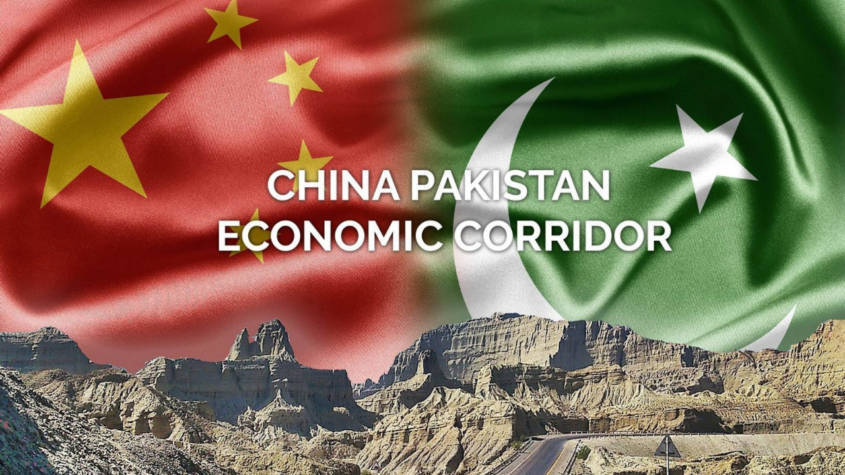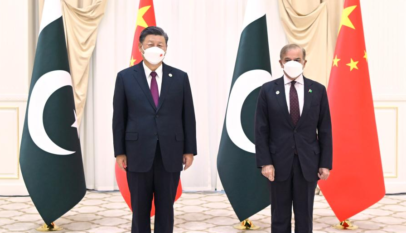Pakistan achieves domestic consensus, ensures security of CPEC
China has envisioned Belt and Road Initiative (BRI) to promote regional connectivity and utilize its heavy industrial base for the socio-economic development of the whole region. Completion of the China Pakistan Economic Corridor (CPEC), the heart of BRI, is the primary concern of both countries. Pakistan did a good job by achieving domestic consensus over CPEC and ensuring the securing of projects linked to CPEC. Pakistan has addressed the real challenge of timely completion of this mega project with acute professionalism and dedication.
A recently published book entitled, “The China-Pakistan Economic Corridor of the Belt and Road Initiative: Concept, Context and Assessment” provides an in-depth analysis of this gigantic Chinese project. The author ‘Siegfried O. Wolf’ has researched and highlighted the philosophy behind Belt and Road Initiative (BRI) and more on about the strategy of Economic Corridors (ECs). The primary objectives of having these economic corridors are to connect China with its neighbours and the countries having raw material and energy resources. The raw material and energy resources are essentially required by China for its sustained growth and economic development. China may have a heavy industrial base for the production of goods; however it lacked the energy resources needed to run its huge industrial base. The home-grown Chinese energy resources are insufficient to meet the requirement of this colossal economic base.
Currently, China is importing over 80% of its energy resources from Middle East, Central Asia and African Continent. Chinese imports for its energy resources from Middle East and Africa pass through the Indian Ocean all along until it enters into South China Sea. The Strait of Malacca is a key point in the Indian Ocean which can put Chinese imports into lot of constraint in a future regional and global security scenario. The Strait is, indeed, a narrow passage of water between the Indonesian island of Sumatra and the Malay Peninsula. The Indian Ocean Region (IOR) is guarded by Indian and other regional states which are friendly to the United States.
The former Chinese President Mr Hu Jintao identified this vulnerability of China as ‘Chinese Malacca Dilemma in 2003. Since then Chinese leadership and think-tanks have been working on the project to find some alternative for the Chinese imports, especially its energy needs. In the event of blocked of Malacca Strait, there are less alternatives routes available to China for its trade and imports. The ‘Sunda Strait’ is the nearest alternative for the continuation of Chinese trade and imports, however, its ‘narrowness and shallowness’ make it as incompatible to take on the weight of modern ships and heavy traffic. Lombok and Makassar Straits provide yet other alternatives to China for the continuation of its imports. However, China considers this inappropriate since it is causing heavy expenditure owing to longer routes. It may cost China “additional shipping costs, ranging from $84 to $220 billion per year.”
Under the prevailing regional and global security situation, China Pakistan Economic Corridor (CPEC) is the only secure route, which can guarantee the Chinese energy security. It is less expensive and more secure for the sustenance of Chinese energy needs. It is a project which China has envisioned after years of deliberations, while weighing its pros and cons. President Xi Jinping is the architect of this project, who has been embarked upon the position of life-time President and Secretary General of Communist Party of China (CPC).
From the Chinese perspective CPEC is the most significant part of BRI. The timely completion of CPEC will provide a boost for the completion of other projects and corridors of the BRI. The Chinese dream for global governance depends a lot on the implementation of BRI and CPEC. BRI is a dream of President Xi Jinping which he derived from two motivations. One, the Chinese Renaissance by restoring its centuries old global position and two, fulfilling the Deng Xiaoping’s idea of Chinese modernization. It is to be noted that China was world dominant power until 18th Century. It had trade relations with all international countries and civilizations up-to and even beyond Atlantic Ocean. All Chinese relationships with rest of the world were through Silk Road which President Xi Jinping has envisioned to revive through Belt and Road Initiative (BRI).
The primary motives China plans to attain through CPEC are purely economic and commercial in nature. China desires an un-interrupted flow of its energy resources (oil) from the Middle East and Africa through Gwadar Deep Sea Port. The true manifestation and utilization of this deep sea port can be done through the development of CPEC, an important artery of the BRI.
Upon its completion, there will be an assured energy security for the Chinese energy imports. Chinese energy security would further guarantee the continuation and expansion of Chinese industrial development and economic growth. Upon completion of its geo-economic objectives, China will be more sure economically. The geostrategic and geopolitical goals of China are intrinsically linked with its economic development. After all, economy drives the global politics and Chinese economy has progressed through leaps and bounds in the last few decades, stands next to US economy today.
In a rapidly evolving regional and global security situation, Pakistan holds the key for the continuance of Chinese economic development by providing a secure energy corridor. Sequel to the development and operationalization of Gwadar Port, completion of CPEC as per schedule is the real challenge, facing China and Pakistan. Two security divisions under Pakistan Army have been established to ensure physical security of the CPEC route. Achieving domestic consensus over CPEC and securing its route were gigantic tasks, planned and executed by Pakistan with a lot of foresight, professionalism and dedication. While the developmental work on CPEC is underway, there is a need to secure the long-term economic interests of Pakistan. The utilization of Pakistani geopolitics for the CPEC warrants two things; the ownership of the corridor must be with the state of Pakistan and a sizable portion of the economic dividends of the CPEC must be given to Pakistan for the development of education, health and other projects of human security.
CPEC and Kazakhstan’s vital role in regional trade
The Republic of Kazakhstan has opened doors for the expansion of trade with Pakistan that …













